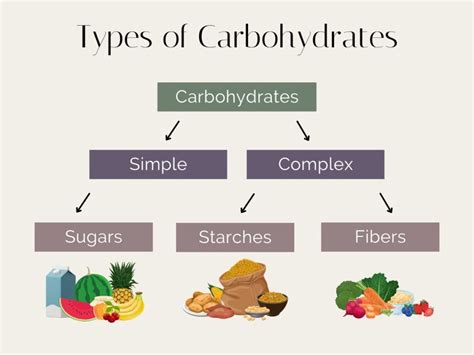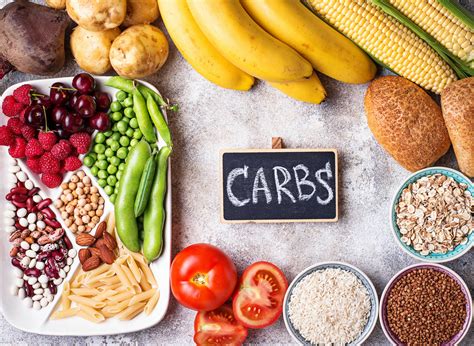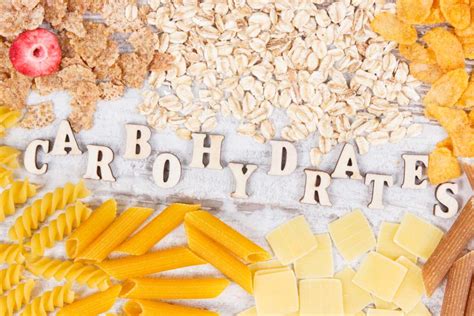Intro
Discover a comprehensive Carbohydrates Foods List, featuring whole grains, fruits, vegetables, and legumes, to help manage carb intake and boost nutrition with healthy complex carbs and fiber-rich options.
Carbohydrates are one of the primary sources of energy for the human body. They are an essential part of a healthy diet and are found in a wide variety of foods. Understanding the different types of carbohydrates and their sources can help individuals make informed choices about their diet and maintain a healthy lifestyle. In this article, we will delve into the world of carbohydrates, exploring their importance, types, and providing a comprehensive list of carbohydrate-rich foods.
Carbohydrates play a vital role in the body's functioning, from providing energy for daily activities to supporting the growth and repair of tissues. They are composed of carbon, hydrogen, and oxygen atoms, and their name reflects their chemical composition. The body breaks down carbohydrates into glucose, which is then used by cells for energy. Without sufficient carbohydrates, the body may start to break down fat and protein for energy, leading to fatigue, weakness, and other health issues.
A diet rich in carbohydrates can provide numerous health benefits, including maintaining a healthy weight, supporting digestive health, and reducing the risk of chronic diseases such as heart disease and diabetes. Carbohydrates are also essential for athletes and individuals who engage in regular physical activity, as they provide the energy needed to perform at optimal levels. With so many carbohydrate-rich foods available, it's easy to incorporate them into a healthy and balanced diet.
Types of Carbohydrates

There are several types of carbohydrates, including sugars, starches, and fibers. Sugars are simple carbohydrates found in foods such as fruits, vegetables, and dairy products. Starches are complex carbohydrates found in foods such as grains, legumes, and starchy vegetables. Fibers are non-digestible carbohydrates found in foods such as whole grains, fruits, and vegetables. Each type of carbohydrate has its own unique benefits and functions in the body.
Simple Carbohydrates
Simple carbohydrates, also known as sugars, are composed of one or two sugar molecules. They are quickly digested and absorbed by the body, providing a rapid source of energy. Examples of simple carbohydrates include fructose, glucose, and sucrose. Simple carbohydrates are found in a variety of foods, including fruits, vegetables, and dairy products.Complex Carbohydrates
Complex carbohydrates, also known as starches, are composed of three or more sugar molecules. They are slower to digest and provide a more sustained source of energy. Examples of complex carbohydrates include whole grains, legumes, and starchy vegetables. Complex carbohydrates are rich in fiber, vitamins, and minerals, making them a nutritious and healthy choice.Carbohydrate-Rich Foods

Carbohydrates are found in a wide variety of foods, including grains, legumes, fruits, vegetables, and dairy products. Here are some examples of carbohydrate-rich foods:
- Grains: bread, pasta, rice, cereals, and oats
- Legumes: beans, lentils, and peas
- Fruits: apples, bananas, berries, and citrus fruits
- Vegetables: broccoli, carrots, corn, and potatoes
- Dairy products: milk, yogurt, and cheese
Grains
Grains are a rich source of carbohydrates and are an essential part of a healthy diet. Whole grains, such as brown rice, quinoa, and whole wheat bread, are rich in fiber, vitamins, and minerals. Refined grains, such as white rice and white bread, are lower in fiber and nutrients but can still provide a rapid source of energy.Legumes
Legumes are a type of complex carbohydrate that are rich in protein, fiber, and nutrients. They are a versatile food that can be used in a variety of dishes, from soups and stews to salads and stir-fries. Examples of legumes include beans, lentils, and peas.Fruits
Fruits are a natural source of simple carbohydrates and are rich in vitamins, minerals, and antioxidants. They are a healthy and nutritious choice for snacks and desserts. Examples of fruits include apples, bananas, berries, and citrus fruits.Vegetables
Vegetables are a rich source of complex carbohydrates and are low in calories and fat. They are rich in fiber, vitamins, and minerals and can help support digestive health and reduce the risk of chronic diseases. Examples of vegetables include broccoli, carrots, corn, and potatoes.Benefits of Carbohydrates

Carbohydrates provide numerous health benefits, including:
- Providing energy for daily activities
- Supporting digestive health
- Reducing the risk of chronic diseases such as heart disease and diabetes
- Supporting healthy weight management
- Providing essential nutrients such as fiber, vitamins, and minerals
Energy Source
Carbohydrates are the body's primary source of energy. They are broken down into glucose, which is then used by cells for energy. Without sufficient carbohydrates, the body may start to break down fat and protein for energy, leading to fatigue, weakness, and other health issues.Digestive Health
Carbohydrates, particularly fiber-rich foods, can help support digestive health. Fiber can help regulate bowel movements, prevent constipation, and support the growth of beneficial gut bacteria.Chronic Disease Prevention
A diet rich in carbohydrates, particularly whole grains, fruits, and vegetables, can help reduce the risk of chronic diseases such as heart disease and diabetes. Carbohydrates are rich in antioxidants, fiber, and other nutrients that can help protect against cell damage and inflammation.Carbohydrate-Deficient Diets

Carbohydrate-deficient diets, such as the ketogenic diet, have gained popularity in recent years. These diets restrict carbohydrate intake, forcing the body to burn fat for energy instead. While these diets can be effective for weight loss and improving blood sugar control, they may not be suitable for everyone, particularly athletes and individuals who engage in regular physical activity.
Risks of Carbohydrate Deficiency
A carbohydrate-deficient diet can lead to several health risks, including:- Fatigue and weakness
- Constipation and digestive issues
- Nutrient deficiencies
- Decreased athletic performance
Conclusion and Recommendations

In conclusion, carbohydrates are an essential part of a healthy diet, providing energy, supporting digestive health, and reducing the risk of chronic diseases. A balanced diet that includes a variety of carbohydrate-rich foods, such as whole grains, fruits, vegetables, and legumes, can provide numerous health benefits. It's essential to be aware of the different types of carbohydrates and their sources to make informed choices about our diet.
We recommend consuming a variety of carbohydrate-rich foods, including whole grains, fruits, vegetables, and legumes. It's also essential to be mindful of portion sizes and to choose carbohydrate-rich foods that are low in added sugars, salt, and unhealthy fats. By incorporating a balanced mix of carbohydrates into our diet, we can maintain a healthy weight, support digestive health, and reduce the risk of chronic diseases.
What are the main sources of carbohydrates?
+Carbohydrates are found in a wide variety of foods, including grains, legumes, fruits, vegetables, and dairy products.
What are the benefits of carbohydrates?
+Carbohydrates provide energy, support digestive health, and reduce the risk of chronic diseases such as heart disease and diabetes.
Can a carbohydrate-deficient diet be harmful?
+A carbohydrate-deficient diet can lead to fatigue, weakness, constipation, and nutrient deficiencies, particularly if not properly planned.
We invite you to share your thoughts and experiences with carbohydrates in the comments below. How do you incorporate carbohydrates into your diet? What are your favorite carbohydrate-rich foods? Share this article with your friends and family to help them make informed choices about their diet and maintain a healthy lifestyle.
